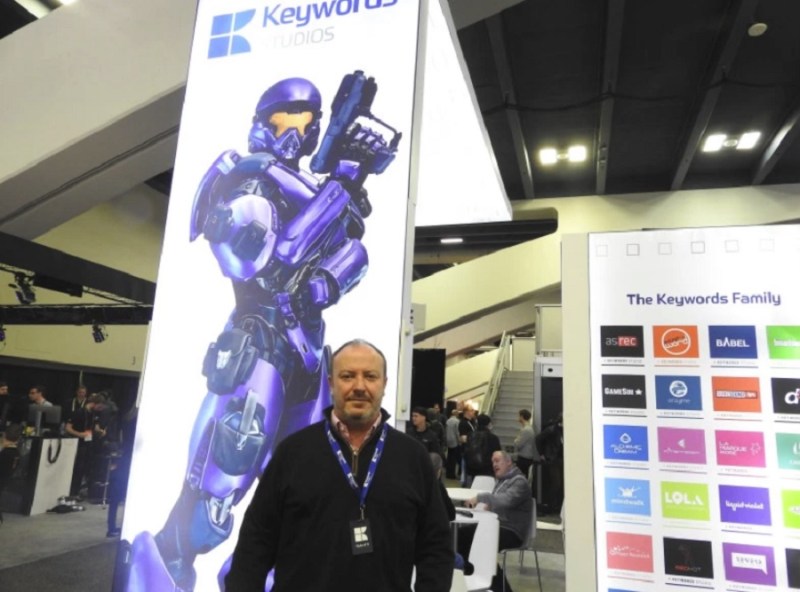You may not have heard about Keywords before, but it has become a big player behind the scenes in external game development. Headed by CEO Andrew Day, the company acquired 11 game development services companies in 2017. It has amassed more than 5,000 employees
Keywords was founded as a game localization company in 1998 in London, and it went public in 2013. It now has facilities in 42 locations in 20 countries and four continents. The company provides just about any service for games, including art, engineering, audio, localization, player support, and game testing.
The biggest game companies use Keywords to launch their games in multiple languages on the same day across the globe. It tests those games to make sure that they work properly across platforms and regions. In November 2017, it acquired Seattle-based VMC Consulting, which was the biggest North American company testing video games.
I caught up with Day at the recent Game Developers Conference to talk about the global market for game development. Here’s an edited transcript of our interview.

Above: Keywords Studios CEO Andrew Day.
GamesBeat: Tell us about Keywords.
Andrew Day: What Keywords is today isn’t what Keywords was. We started as a localization company, actually, localizing business software. Then, as games started to be localized, we found a niche for our services where we could marry the highly creative, immersive localization of storytelling in games with a more tool-based localization that’s used in business software. We created a bit of a niche of ourselves.
We became specialized in language services for video games, both the translation and testing of video games. Video games are made simultaneously in multiple languages, unlike film and TV, where it’s sequentially produced. Games are particularly complex and often very story driven, very rich in content. Cultural adaptation for games is complex. It’s a very specialized skill set. That’s where we started.
We saw that the games market as a whole was very imbalanced and a little bit fragile. You have very large global publishers, and they’re relying on hundreds of small companies for outsource services, just like Keywords in the 2000s. It seemed very imbalanced. You don’t see that in other industries. Hundreds of small companies, country by country, service line by service line. We thought this couldn’t continue. There would have to be some consolidation. If you’re a large company and you want to act more strategically with outsource providers, there’s nobody to engage with, nobody of any scale or sophistication, with the business acumen and transparency and financial strength and so on.
We set ourselves up to lead the consolidation in the industry, bringing together all these capabilities, all this expertise, and making it available to our clients. None of what we do can we use ourselves. Everything we do is for our clients. When we’re buying another company, adding it to the Keywords family, we’re not taking that talent for ourselves. We make that talent available to all the video game companies out there.
We’re providing a framework, a financial backbone. We’re using our management tools to control what we’re doing, so we can be efficient. High utilization rates. Decent levels of profitability. Good investment.

Above: Keywords develops across all platforms.
GamesBeat: How big are you now?
Day: We’re now 5,000 people around the world in 42 locations. We’re about a third in Asia, a third in North America, and a third in Europe. We have, for instance, about 700 [to] 800 people in China, 250 in Tokyo, 350 in Manila, and 500 in India. Here in North America, we have about 900 people in the U.S. and then about 1,500 in Canada. The U.S. people are in Seattle, Los Angeles, and Raleigh, North Carolina.
GamesBeat: So even in some high-cost areas?
Day: Yes. What we do — we’re not an offshore outsourcing company. The skill sets are very specific to video games and to interactive content generally. It’s more about the skill than it is about finding low-cost centers. You can’t find the talent. You can’t find people that can translate games into 30 languages in India. You have to be where the talent is. Also, where we can, we want to be near our clients.
We’re able to do a two-footed approach. We have one foot on the West Coast and one foot in India or China, which helps manage communications, manage cultural expectations on things like art creation, and still get some benefit of lower costs. But it’s really not about cost so much. That’s important, but more important is the efficiency, getting it right the first time, and the overall service. If, through delivery of what we do, we put a lot of burden on the client side to manage it, it doesn’t add up.
GamesBeat: The platforms that are your most popular, are there any in the lead there?
Day: We’re agnostic to platform. About 30 percent of our business is on mobile, and the rest is on PC and console. VR/AR is also an important component of what we do. But it’s really across the board. We don’t differentiate internally in terms of how we manage the business by hardware type. Obviously, we’re investing in all the new hardware as it comes out, so we can test and develop on it. We’re authorized by all the major platform holders to get development kits and test kits and so on.

Above: Keywords acquired 11 companies in 2017.
GamesBeat: I wrote a story about the people who made Cuphead out of Canada. They’re a small company, two dozen people at peak, and in the last six months, they got into a deal with a company called Illogika and doubled the size of their team. It sounded like an emergency move but not the usual way something like that would happen in your business.
Day: There’s all sorts of business in our business. There is the situation where a client’s got a problem, and they need help, and we can dig them out. But more of it is planned. We have reasonable visibility. Our clients share with us their slate of work for the coming year. They let us know what they want us to help them with, so we can plan ahead a bit. That’s important for everyone.
The repeat business is very high. There’s a lot of trust in this. Games are very complex. Not many organizations out there have worked on these big games before. When you get into that highly agile process, which game development is, it doesn’t suit a lot of more structured companies. I can imagine, if you come from software services generally and you find yourself in the game space, you’d think, “My God, what is this about? I’ve never seen something quite so chaotic.”
GamesBeat: I’m reading Jason Schreier’s book right now.
Day: Yes, yes.
GamesBeat: He found a bunch of stories from game development, whether it’s Naughty Dog at 500 people or one guy making Stardew Valley for five years.
Day: Lots of different ways of cracking the same nut, potentially.
GamesBeat: A lot of crunch.
Day: Well, this is the other thing about the industry. The way I look at it, the industry has only been around for 30-odd years. When people started to make games, they had to do everything themselves internally because there was no other way of doing it. A lot of our clients have built their business in that same mode. They haven’t had time to stop and think. “If I were starting this business today, would this be the way I’d build it?”
They describe themselves as publishers, but they actually have all the means for production as well. They’ve become very large organizations. There must be a lot of overhead in managing a large testing department or a translation workflow where you’re dealing with 10 or 20 or 30 different vendors to make 20 different language versions of a game. People perpetuate those behaviors. You can understand, in part, why they do that.
But our whole idea is we’ve now created the scale and geographic reach such that, for those clients that want to, they can offload some of those activities on us and focus on what is strategically important to them, which is always about the IP, commercializing the IP and being able to tweak the player experience to make that better, more engaging, keep the player for longer. If you keep the player longer, you have the chance of getting more revenue. The trend toward games as a service has been very fast, very demanding, adding a lot of complexity to our clients. One way they can manage some of this complexity is to offload some of the services side, which might now look like a distraction.

